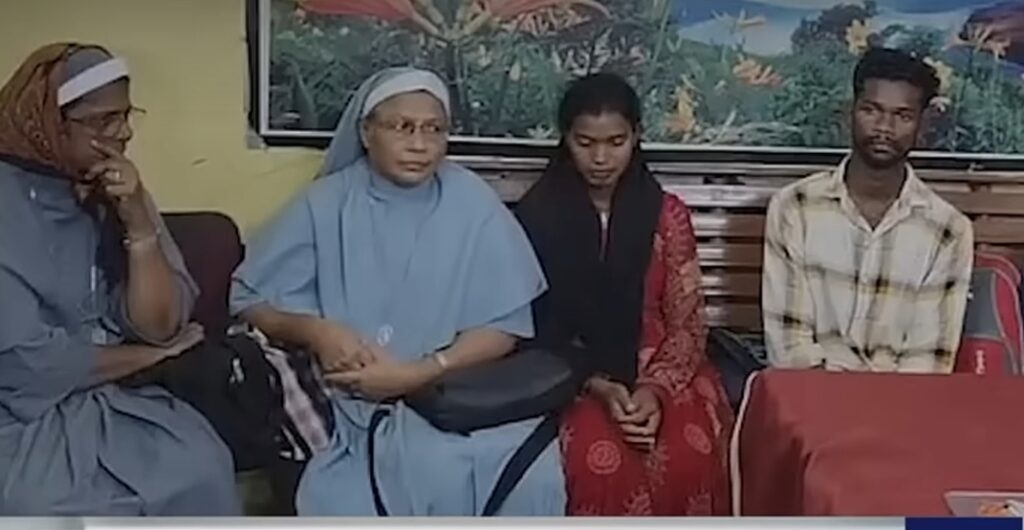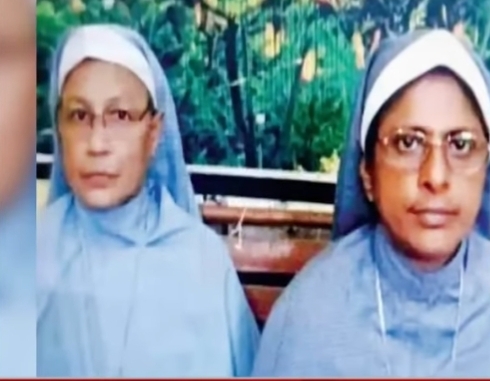

The Nuns of Durg: A Tale of Innocents, Bullies, and Bail
The arrest of two Kerala nuns, Preethi Merry and Vandana Francis, alongside tribal youth Sukaman Mandavi, at Chhattisgarh’s Durg Railway Station on July 25, 2025, sparked a firestorm of controversy, exposing the fraught intersection of religion, politics, and justice in India. Accused of human trafficking and forced religious conversion by a Bajrang Dal activist, the trio endured nine days in custody before a special National Investigation Agency (NIA) court in Bilaspur granted them conditional bail on August 2, 2025. This case, rooted in allegations that crumbled under scrutiny, underscores a broader societal malaise: the elevation of bullies and the persecution of innocents. It is a stark reminder that justice, when entangled with communal agendas, risks becoming a tool of oppression rather than a shield for the vulnerable.
The Incident: A Clash at Durg Station
Allegations and Arrest
On July 25, 2025, Sisters Preethi Merry and Vandana Francis, members of the Assisi Sisters of Mary Immaculate, were arrested at Durg Railway Station alongside Sukaman Mandavi. The trio was accompanying three tribal women from Narayanpur, who were reportedly travelling to Agra for employment at a convent. A local Bajrang Dal functionary, Ravi Nigam, filed a complaint alleging that the nuns and Mandavi were forcibly converting and trafficking the women. The Government Railway Police (GRP) acted swiftly, booking them under Section 143 of the Bharatiya Nyaya Sanhita (BNS) for trafficking and Section 4 of the Chhattisgarh Freedom of Religion Act, 1968, for forced conversion.
The accusations, however, unraveled quickly. The families of the three women denied any coercion, stating their daughters were practicing Christians and had traveled willingly with parental consent. The women themselves, in statements to the police, affirmed their long-standing Christian faith, contradicting claims of forced conversion. Yet, the nuns and Mandavi were detained, subjected to public humiliation by Bajrang Dal activists—allegedly led by Jyoti Sharma—in full view of passive police officers. This incident, far from isolated, reflects a pattern of vigilante overreach under the guise of protecting religious identity.
The Legal Battle: A Triumph of Reason
NIA Court’s Verdict
After initial bail denials by lower courts in Durg, which cited jurisdictional issues, the case was escalated to the NIA court in Bilaspur. On August 2, 2025, Principal District and Sessions Judge Sirajuddin Qureshi granted conditional bail to the trio, requiring a ₹50,000 bond, two sureties, passport surrender, and cooperation with the investigation. The court’s ruling hinged on the lack of credible evidence: the FIR was based on “mere apprehension and suspicion,” with no prior criminal history for the accused and affidavits from the women’s parents refuting trafficking or conversion claims.
The prosecution’s case collapsed under its own weight. Public Prosecutor Dauram Chandravanshi argued that the investigation was in its early stages, but the court found no basis for continued detention, noting the absence of any requisition for custodial interrogation. The ruling was a rebuke to the overzealous application of anti-conversion laws, which have increasingly been weaponized to target minorities in states like Chhattisgarh.
Political Firestorm: A Nation Divided
Outrage and Solidarity
The arrests triggered widespread protests, particularly in Kerala, where the ruling Left Democratic Front (LDF) and opposition Congress condemned the incident as religious persecution. Kerala Chief Minister Pinarayi Vijayan wrote to Prime Minister Narendra Modi, urging intervention, while Congress leader Rahul Gandhi labeled the arrests “BJP-RSS mob rule.” CPI(M) MP John Brittas hailed the bail as a “victory of the Constitution,” vowing to push for the FIR’s dismissal. The Catholic Bishops’ Conference of India (CBCI), led by Archbishop Andrews Thazhath, welcomed the bail but called for the case to be quashed, emphasizing the nuns’ selfless service and the need to protect minority rights.
The case also exposed rifts within the Bharatiya Janata Party (BJP). Kerala BJP chief Rajeev Chandrasekhar described the arrests as a “misunderstanding,” distancing his unit from the Chhattisgarh BJP’s initial reluctance to support bail. Home Minister Amit Shah’s reported intervention underscored the case’s political sensitivity. Meanwhile, protests in Kochi saw nuns and civil society members demanding justice, reflecting a rare cross-party consensus in Kerala against the arrests.
Bullies vs. Innocents: A Broader Lens
The Rise of Vigilante Justice
The Durg incident is not merely a legal skirmish but a symptom of a deeper societal ill: the emboldening of vigilante groups like Bajrang Dal, often with tacit state support. The nuns’ ordeal—publicly harassed by activists while police stood by—mirrors a growing trend of mob-driven “justice” targeting minorities. Anti-conversion laws, intended to curb coercive proselytizing, have become tools for harassment, particularly in BJP-ruled states. The Chhattisgarh Freedom of Religion Act, with its harsh penalties, exemplifies how legal frameworks can be manipulated to fuel communal narratives.
This case echoes other instances of innocents targeted by bullies: Muslim traders lynched over cattle transport, Indian students attacked abroad for their ethnicity, or displaced Gazans caught in geopolitical crossfires. The common thread is the persecution of the vulnerable by those wielding power—whether vigilantes, state actors, or global regimes. As Dr. Oscar Rebello argues, the fight is not about defending specific faiths but about upholding the dignity of innocents against bullies, regardless of context.
The Nuns’ Grace: A Beacon of Resilience
Standing Firm Amid Adversity
Preethi Merry and Vandana Francis, both from devout families with siblings in the Church, displayed remarkable composure during their ordeal. A widely circulated video captured their dignity in the face of harassment, neither retaliating nor succumbing to despair. Their congregation, the Assisi Sisters of Mary Immaculate, emphasized their lifelong service and clean record, with provincial general Nithya Francis ensuring Preethi’s diabetic condition was managed in custody. Their release from Durg Central Jail on August 2 was met with cheers from supporters, including MPs and BJP leaders, signalling a rare moment of unity.
A Call for Justice and Reflection
Beyond Bail: The Road Ahead
While the bail is a victory, it is not absolution. The CBCI and political leaders continue to demand the case’s dismissal, arguing that the charges were baseless and driven by communal bias. The women’s families and the alleged victims have sought action against Bajrang Dal members for assault and coercion, highlighting the need for accountability. The case tests India’s commitment to secularism and the rule of law, raising questions about whether legal mechanisms will protect or persecute minorities.
The Durg incident is a microcosm of a global struggle between bullies and innocents. From vigilante mobs in India to authoritarian regimes worldwide, the elevation of power over justice threatens democratic values. The nuns’ case is a clarion call to defend the vulnerable, not selectively but universally, across religious, regional, and political divides. As civil society grapples with this challenge, the resilience of Preethi Merry and Vandana Francis stands as a testament to the enduring power of innocence in the face of adversity.
Hasnain Naqvi is a former member of the history faculty at St. Xavier’s College, Mumbai





